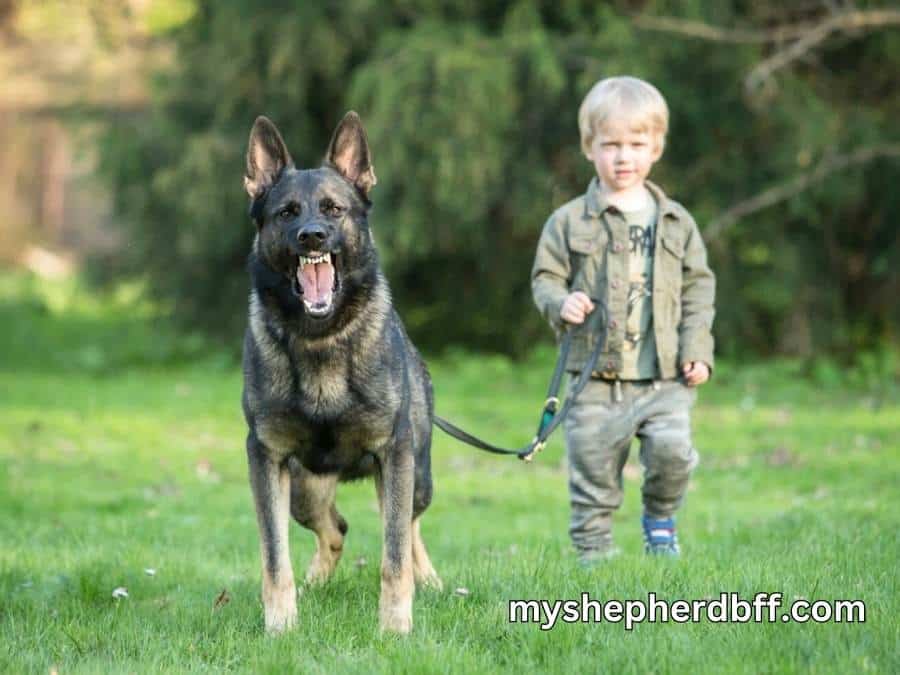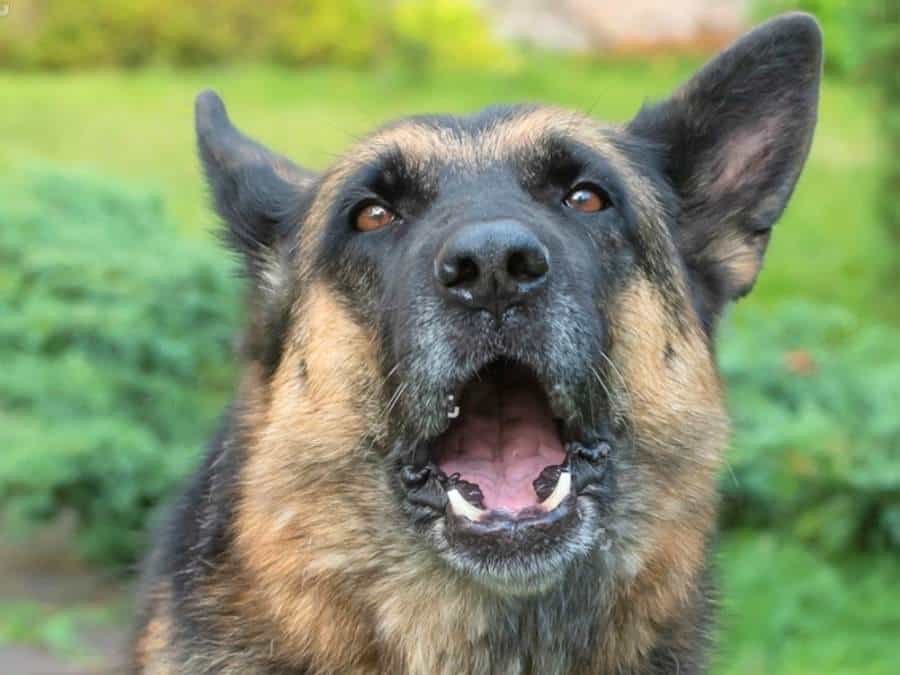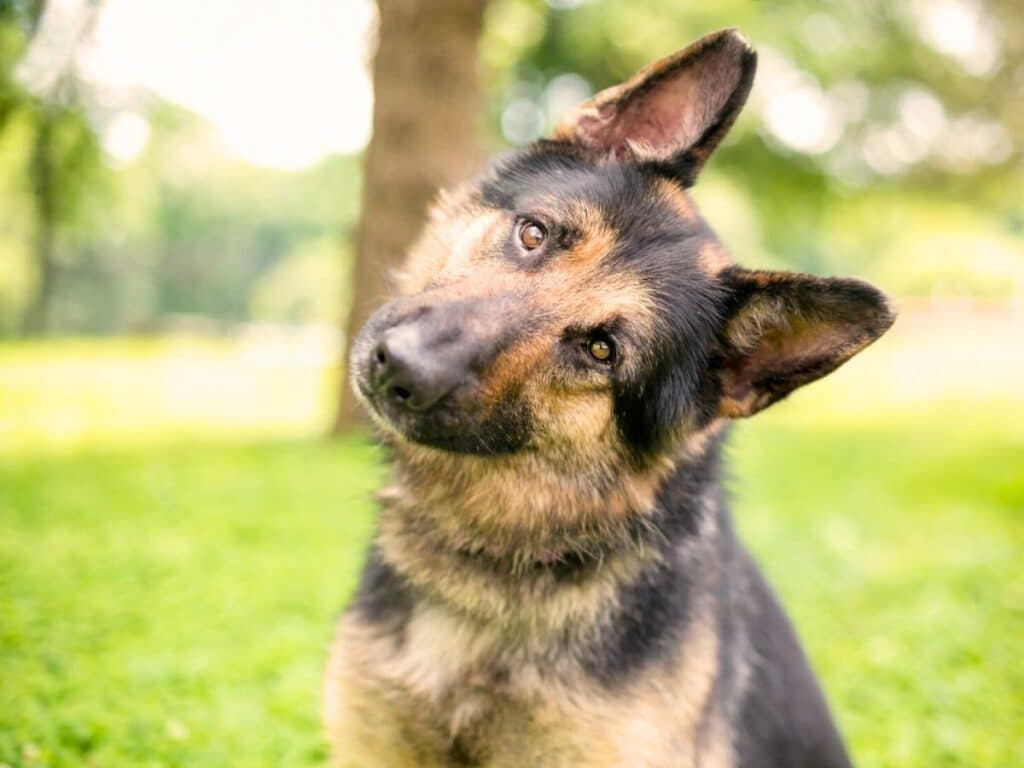Are German Shepherds protective? Well, let me tell you, these four-legged guardians possess innate characteristics that make them natural protectors. Their strong instincts kick in when they sense any potential threat to their family or territory. This remarkable trait has made them highly sought after as guard dogs for both homes and law enforcement agencies.
If you’re considering bringing a German Shepherd into your life, understanding their protective nature is crucial for responsible ownership. It goes beyond just having a furry companion; it means embracing the responsibility that comes with owning such an exceptional breed.
So buckle up and get ready to uncover what makes German Shepherds such formidable protectors!
Are German Shepherds Protective?
Yes, German Shepherds are known for being highly protective. They are often used as police and military dogs due to their natural instinct to protect and serve. German Shepherds are loyal and devoted to their families, making them excellent guard dogs.
They have a natural protective drive and will do whatever it takes to keep their loved ones safe. Their intelligence and trainability also contribute to their protective nature, as they can be easily trained to respond to potential threats.
However, it is important to note that proper socialization and training are essential to ensure that their protective instincts are channeled in a positive and controlled manner.
RELATED: Role & History of German Shepherd Military Dogs
Why Are German Shepherds So Protective?

German Shepherds are known for being protective due to a combination of their genetics, instincts, and training. Here are some reasons why they exhibit protective behavior:
1. Genetics and breeding
The founder of German Shepherds, Max von Stephanitz, bred them in the late 1800s in Germany for herding livestock, guarding property, and protecting their human companions. These traits were selectively bred into the breed over generations, resulting in a natural inclination towards protectiveness.
German Shepherds with a genetic predisposition for protection may exhibit heightened territorial instincts and a strong desire to guard their family members. This protective instinct can manifest as aggression or excessive vigilance when perceived threats are present.
It’s important to note that not all German Shepherds will display overprotective behavior solely due to genetics. Other factors such as socialization and experiences also play a significant role.
RELATED: Why German Shepherds Are The Best Guard Dogs?
2. Loyalty
German Shepherd’s loyalty to their owners makes them highly attuned to any potential threats or dangers. They have a natural instinct to safeguard their loved ones, and this instinct is amplified by their loyalty.
Their loyalty also helps in building a strong bond between the German Shepherd and their owner. This bond enhances their protective instincts as they feel a deep sense of responsibility towards their owner’s well-being.
RELATED: Do German Shepherds Like To Be Held?
3. High energy levels
GSD’s high energy allows them to be constantly alert and vigilant, making them excellent watchdogs. They are always on the lookout for any potential threat or danger, and their quick reflexes and agility enable them to respond swiftly if needed.
Additionally, their high energy levels make them highly trainable and obedient. This means that they can be easily taught commands and behaviors that enhance their protective instincts, such as guarding the house or protecting their family members.
Also, their high energy levels enable them to be physically strong and agile, which is essential for their protective role. German Shepherds are known for their muscular build and endurance, allowing them to chase and apprehend intruders if necessary.
4. Traumatic experiences
Dogs that have experienced trauma may develop heightened anxiety or fear-based responses towards certain triggers or situations.
For example, if a German Shepherd was mistreated by a stranger, they may develop a deep-seated distrust towards unfamiliar individuals. This can lead to overprotective behavior as the dog perceives any unknown person as a potential threat.
Providing a safe and supportive environment, along with positive reinforcement training, can help rebuild trust and reduce their inclination towards excessive protectiveness.
At What Age Do German Shepherds Start Guarding?

German Shepherds typically start displaying guarding behaviors at around 6 to 9 months of age. However, it is important to note that the intensity and effectiveness of their guarding instincts may develop further as they reach adulthood.
During their puppyhood, German Shepherds may exhibit some protective behaviors, such as barking at unfamiliar noises or strangers approaching their territory. As they grow older and their training progresses, they can be trained to become reliable guard dogs.
Here are some key developmental stages regarding guarding behavior:
Early Months
During their early months, German Shepherd puppies are still learning and developing their instincts. While they may show some protective tendencies, their behavior is often more exploratory and playful rather than focused on guarding.
Adolescence
As German Shepherds enter their adolescent stage, usually around six to twelve months of age, their protective instincts may start to emerge more prominently. They become more aware of their surroundings and show increased alertness, especially towards unfamiliar people or potential threats.
Maturity
German Shepherds typically reach full maturity between one and two years of age. It is during this stage that their protective instincts become more defined and consistent. They become more assertive in guarding their family, home, and territory.
RELATED:
How to Tell if Your German Shepherd Is Protective?

There are several signs that can indicate if your German Shepherd is displaying protective behavior. Here are some common indications:
1. Alertness
A protective German Shepherd will always be on high alert. They will have a keen sense of their surroundings and will be quick to react to any potential threats. You may notice that your German Shepherd is constantly scanning their environment and paying close attention to any unusual sounds or movements.
2. Watchfulness
If your German Shepherd frequently keeps an eye on family members, constantly monitoring their movements and positioning themselves between their loved ones and potential threats, it can be a sign of their protective nature.
ELATED: Are German Shepherds Good Family Dogs?
3. Vocalization
German Shepherds may bark or growl when they perceive a threat. If your dog becomes vocal and alert in response to strangers or unusual sounds, it could be an indication of their protective instincts kicking in.
RELATED: Do German Shepherds Bark a Lot?
4. Body language
Pay attention to your German Shepherd’s body language. A protective German Shepherd may have a more upright posture, with their ears forward and their tail held high. They may also have a more intense gaze and may even bare their teeth or show other signs of aggression if they feel the need to protect.
RELATED: Do German Shepherds Get Along With Cats?
5. Boundary Protection
German Shepherds with a protective instinct will often establish and defend their territory. They may patrol the perimeter of the property, bark at or investigate unfamiliar people or animals approaching their territory, and display signs of boundary enforcement.
It is important to remember that while German Shepherds have a natural protective instinct, each dog is an individual and may display different levels of protectiveness.
Elevate your dog’s protective instincts to a whole new level with the ‘Brain Training For Dogs Course.’ Learn the techniques to develop a loyal and vigilant guardian while maintaining a loving and balanced companion.
RELATED:
- German Shepherd Signs of Affection
- German Shepherd Behavior: Their Strange Quirks Explained
- Why Does My German Shepherd Want To Sleep With Me?
My German Shepherd is Too Protective

If you feel that your German Shepherd is overly protective, it’s important to address and manage this behavior to ensure a well-balanced and manageable relationship. Here are some steps you can take:
1. Professional Guidance
Seek the assistance of a professional dog trainer or behaviorist experienced with German Shepherds. They can assess the situation, provide personalized advice, and guide you through training techniques specific to your dog’s needs.
2. Training and Socialization
Focus on obedience training and socialization exercises to help your German Shepherd develop better impulse control and appropriate responses in different situations. This can include exposing them to various environments, people, and animals in a controlled manner to desensitize them to potential triggers.
3. Establish Boundaries
Teach your German Shepherd clear boundaries and reinforce obedience commands. This will help them understand when protective behavior is appropriate and when it is not. Consistency is key in reinforcing these boundaries.
4. Controlled Exposure
Gradually expose your German Shepherd to new experiences, people, and situations while maintaining control. This can help them become more confident and less reactive, reducing their need for excessive protection.
5. Avoid Reinforcing Fear or Aggression
Avoid unintentionally reinforcing fear or aggression in your German Shepherd. This includes not rewarding or comforting them when they display overly protective behavior, as it can reinforce their perception of the situation as threatening.
Remember, modifying a dog’s behavior takes time, patience, and consistency. It’s important to work with a professional who can tailor the training approach to your specific dog and circumstances.
Also Read:
Will My German Shepherd Protect Me Without Training?

While German Shepherds have a natural protective instinct, whether or not your German Shepherd will protect you without specific training can vary from dog to dog. Here are a few factors to consider:
- Genetic Predisposition: German Shepherds have a genetic predisposition to exhibit protective behavior. However, the intensity and effectiveness of this behavior can vary among individuals.
- Bond and Relationship: The strength of the bond between you and your German Shepherd can influence their willingness to protect you. If you have a close and trusting relationship, your dog may be more inclined to act protectively in certain situations.
- Socialization: Properly socialized German Shepherds are more likely to distinguish between normal situations and genuine threats. Through exposure to various environments, people, and animals, they can learn to assess situations more accurately.
- Training and Reinforcement: While some protective behavior may occur naturally, training can help channel and refine your German Shepherd’s protective instincts. Training provides them with the tools to respond appropriately to potential threats and helps establish clear boundaries for their protective behavior.
- Temperament and Individuality: Each German Shepherd has its own unique temperament. Some may naturally be more protective, while others may exhibit a more reserved or relaxed demeanor.
It’s worth noting that relying solely on a dog’s natural protective instincts without proper training can be unpredictable and potentially problematic. Without guidance and training, their protective behavior may be excessive, indiscriminate, or challenging to control.
Are All German Shepherds Protective?

No, not all German Shepherds are protective. While German Shepherds are often known for their protective instincts, it is important to understand that individual dogs can have different temperaments and personalities.
Some German Shepherds may exhibit strong protective instincts, while others may be more laid-back or friendly towards strangers. Factors such as genetics, socialization, and training can also influence a German Shepherd’s protective behavior.
It is crucial for owners to provide proper training and socialization to ensure their German Shepherd develops appropriate behaviors and responses to different situations.
Advantages of a Protective German Shepherd
There are several advantages to having a protective GSD:
1. Sense of Security
Having a protective German Shepherd by your side brings an unparalleled sense of security. Whether you live alone or have a family, their presence instills confidence and peace of mind. These loyal companions are always on high alert, ready to protect their loved ones from any potential harm.
2. Effective Deterrents
GSD’sr strong build, fierce appearance, and unwavering loyalty make them formidable opponents to any potential threats or intruders. The sight of a GSD alone is often enough to discourage wrongdoers from approaching your premises. Burglars and trespassers would think twice before crossing paths with these powerful protectors.
3. Trainability for Various Tasks
German Shepherd’s natural instincts combined with proper training allow them to excel in roles such as search-and-rescue or police work.
Their exceptional trainability also extends to personal protection training for individuals who require an added layer of security. By undergoing specialized training programs, GSDs can learn how to assess threats accurately and take appropriate action when necessary.
This makes them ideal companions for those seeking personal protection without compromising the bond between owner and pet.
RELATED: Why Are German Shepherds Used As Police Dogs?
4. Peace of Mind in Certain Situations
If you enjoy outdoor activities such as hiking or camping, having a GSD by your side provides an extra layer of security against potential dangers. Their alertness and protective instincts ensure that you can explore the great outdoors with confidence, knowing that your faithful companion is watching out for any potential risks.
Similarly, families with young children can find solace in the presence of a protective German Shepherd. These dogs are known for their gentle nature towards their human pack members, especially when raised together from a young age.
Disadvantages of a GSD’s Protective Instincts

1. Aggression towards strangers or other animals.
German Shepherd’s natural inclination to protect their family and territory can also escalate into aggressive behavior if not properly channeled.
Without proper training and socialization, a German Shepherd may perceive anyone they consider a potential threat as an enemy. This can result in growling, barking, lunging, or even biting.
To prevent such aggression from occurring, it is crucial for owners to establish clear boundaries and provide consistent training from an early age.
RELATED: Are German Shepherds Good With Other Dogs?
2. Unpredictable behavior
A poorly trained German Shepherd may exhibit fear-based behaviors when faced with unfamiliar stimuli. They might become anxious or defensive when encountering new people or environments.
This unpredictability can make it challenging for owners to handle their dogs effectively and safely navigate everyday situations.
To mitigate this danger, it is essential for owners to invest time in obedience training and socialization exercises right from the start.
3. Misinterpretation of threats
German Shepherds with intense protective instincts may misinterpret situations or stimuli, leading to unwarranted reactions. They may react aggressively or defensively towards harmless individuals or situations, causing unnecessary stress or potential conflicts.
4. Liability and legal concerns
The strong protective nature of German Shepherds can present liability issues, especially if their behavior leads to harm or injury to others. Owners may be held responsible for any damage caused by their dog’s protective behavior, leading to legal and financial consequences.
5. Challenges in public settings
The protective instincts of German Shepherds may make it difficult to have them in crowded public places, such as parks or busy streets. Their heightened awareness and tendency to be reactive can create stressful situations and make it challenging to manage their behavior effectively.
Training a German Shepherd to Be Protective

To harness a German Shepherd’s natural protective instincts effectively, it is crucial to provide them with proper training from an early age.
1. Start with Basic Obedience Training
Before diving into protection-specific exercises, ensure that your German Shepherd has a solid foundation in basic obedience commands such as sit, stay, come, and heel. This establishes you as the pack leader and helps build trust between you and your dog.
2. Socialize your GSD
Expose your German Shepherd puppy to various environments, people, animals (including other dogs), sights, sounds, and smells at an early age. This socialization process helps develop their confidence while ensuring they remain well-rounded and adaptable in different situations.
3. Introduce guarding exercises
Once your GSD has mastered basic obedience commands and is well-socialized, you can begin introducing specific guarding exercises into their training routine. These exercises involve teaching your dog when it is appropriate to bark or growl at potential threats or intruders while remaining under control.
- Teach the “Speak” Command: Start by teaching your German Shepherd to bark on command. Use a specific word or phrase, such as “speak” or “alert,” and reward them with treats and praise when they vocalize.
- Train the “Quiet” Command: Once your GSD has learned to bark on command, teach them the “quiet” command. This helps them understand when it is time to stop barking after an alert has been given.
- Reinforce Guarding Behavior: Gradually introduce scenarios where your German Shepherd needs to guard a specific area or object. For example, you can have someone pretend to be an intruder while your dog practices barking and growling on command. Reward their protective behavior appropriately.
4. Seek professional help if needed
If you feel overwhelmed or unsure about training your German Shepherd to be protective, consider seeking assistance from a professional dog trainer experienced in working with protection dogs. They can provide expert guidance tailored to your dog’s individual needs.
Protective Instincts of Female Vs. Male GSD

When it comes to the protective instincts of German Shepherds, there can be differences between males and females, although individual temperament and training play a significant role. Here are some general considerations:
Maternal Protectiveness in Females
Female GSDs are often described as being more nurturing and maternal in nature. They may exhibit a strong protective instinct towards their family members, especially children.
Female GSDs are known to be highly attentive and vigilant, constantly monitoring their surroundings for any potential threats. When they perceive a threat, they are likely to take action to protect their loved ones.
This protective behavior can manifest in various ways, such as barking, growling, and even physically intervening if necessary.
Territorial Nature of Males
On the other hand, male GSDs are typically more territorial and assertive in their protective instincts. They may be more inclined to guard their home and property, marking their territory and displaying a strong presence to deter potential intruders.
Male GSDs are often seen as being more dominant and confident, which can make them more willing to confront a threat head-on.
They may exhibit more aggressive behavior when it comes to protecting their territory or family, such as barking loudly, lunging, or even engaging in physical confrontation if necessary.
It is important to note that these differences in protective instincts between female and male GSDs are not absolute. Each dog is an individual and may exhibit a combination of traits from both genders.
Personal Story
This is the extraordinary story of how my loyal companion became my fearless guardian.
How My German Shepherd Protected Me from a Group of Stray Dogs
It was a day like any other when a routine walk with my German Shepherd Rocky turned into a heart-pounding, life-changing experience.
The sun was shining brightly as Rocky, and I ventured out for our usual walk along the familiar neighborhood path.
As we strolled along the quiet street, I noticed a commotion in the distance. A pack of stray dogs emerged from around the corner. Fear coursed through my veins as I realized we were outnumbered and vulnerable. My heart raced, and panic began to take hold.
In that moment of vulnerability, Rocky’s demeanor transformed. His ears perked up, and his eyes locked onto the approaching pack. His protective instincts kicked into high gear, and he positioned himself between me and the oncoming threat.
The stray dogs, undeterred by Rocky’s warning, closed in, their aggression escalating. Rocky barked fiercely, his muscular frame poised to defend us at any cost.
The leader of the pack lunged forward, teeth bared, aiming to overpower Rocky. But my heroic savior met the challenge head-on, skillfully evading the attack and delivering a swift counterattack.
With each act of defense, Rocky’s unwavering loyalty and fierce determination became evident. His resolute presence and unwavering bravery emboldened me, giving me the courage to stand my ground and face the chaos unfolding before us.
In a dramatic turn of events, Rocky’s relentless defense and sheer dominance proved too much for the stray dogs. One by one, they retreated with their tails between their legs.
From that day forward, I walk with an unshakable confidence, knowing that my faithful companion, my guardian angel in fur, will always be by my side, ready to protect and defend me against any adversity that may come our way.
Are German Shepherds Protective? Final Words
In conclusion, owning a well-socialized and trained German Shepherd can offer unparalleled protection for you and your family. However, responsible ownership includes recognizing the potential dangers associated with overprotectiveness while nurturing these instincts appropriately. By understanding the unique characteristics of this breed and investing time in proper training techniques, you can ensure your German Shepherd becomes an invaluable guardian.
Frequently Asked Questions (FAQs)
1. How do I socialize my German Shepherd?
Socializing your German Shepherd involves exposing them to various people, animals, and environments from a young age. Gradually introduce them to new experiences, ensuring positive interactions and rewarding good behavior.
2. Can German Shepherds be protective without proper training?
Yes, German Shepherds have an inherent protective nature. However, without proper training and guidance, their instincts may manifest in undesirable ways or become overly aggressive.
3. Are German Shepherds suitable for families with children?
Yes, German Shepherds can be excellent family pets when properly socialized and trained. Their protective instincts often extend to children within the family unit.
4. How can I prevent my German Shepherd from becoming too overprotective?
Consistent training and socialization are key to preventing overprotectiveness in German Shepherds. Enroll them in obedience classes, expose them to different situations, and provide positive reinforcement for appropriate behavior.
5. Do female and male German Shepherds display differences in protectiveness?
While both genders can exhibit similar levels of protectiveness, individual personalities may vary. It is important to consider the specific dog’s temperament rather than relying solely on gender stereotypes.
References & Resources
- ‘The Interaction Between Behavioral Traits and Demographic and Management Factors in German Shepherd Dogs’, Applied Animal Behaviour Science.
- ‘Influence of Breed, Handler Appearance and People’s Experience of Dogs on their Perception of the Temperament of a Breed of Dog in Ireland’, 16th Annual Meeting of the International Society for Anthrozoology, Tokyo, Japan.
- ‘Genetic Analysis of Results of a Swedish Behavior Test on German Shepherd Dogs and Labrador Retrievers’, Journal of Animal Science.




